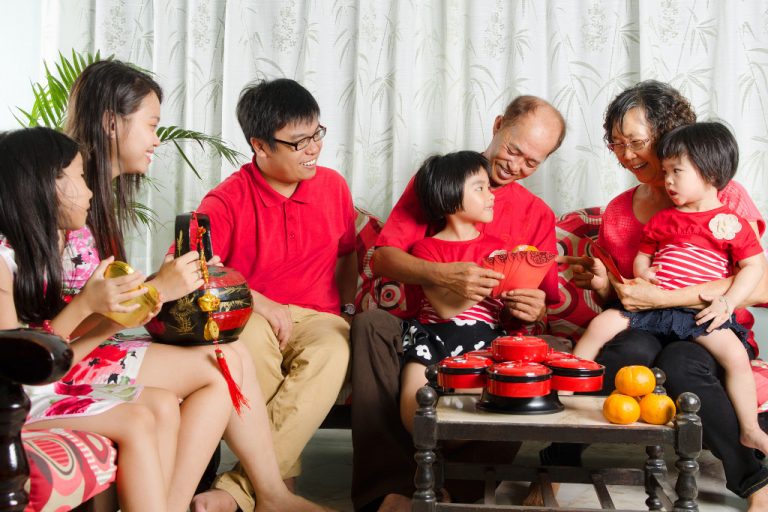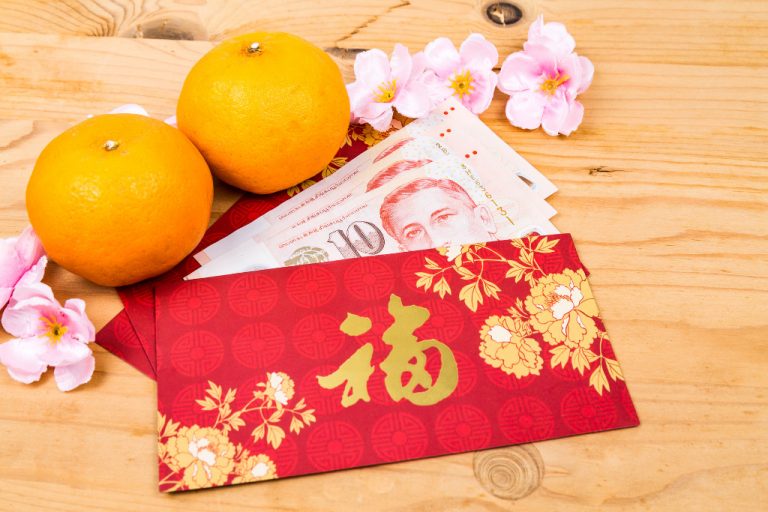SingaporeMotherhood | Parenting
February 2018
CNY Ang Pow Giving Guide: How Much to Give to Friends’, Colleagues’ & Neighbours’ Kids

If you’re a child, teenager (or even an unwed young adult!), Chinese New Year is pretty awesome. Sure, you might need to endure nosy relatives asking you, for the hundredth time, whether you’re dating or intending to get married. But in exchange for that, you’re blessed with a bounty of delicious food and ang pows. Not a bad deal at all!
But once you’ve gotten married and on the other end of the equation? Things get significantly more stressful. You need to sit down with your spouse and decide which homes you’re going to hit up (no more just tagging along with your parents!). And… prepare all the ang pows that you’ll be handing out from now on.
It can be tricky navigating the terrain of ang pow giving for the first time, so we’ve put together this handy guide to help you along. By the way, do note that certain amounts are taboo, such as numbers with odd digits: $5, $15 or $30 (amounts that are typically reserved for funerals). Also, while most Singaporeans aren’t very superstitious, it may be wise to steer away from $4 (which sounds like the word for ‘death’ in Chinese), just to be on the safe side.
1. Relatives: $12 – $20
When it comes to Chinese New Year and ang pow giving, societal norms dictate that the adage “blood is thicker than water” still applies. You’ll be expected to give a larger ang pow to your (unmarried) cousins, nephews, nieces, and other family members, although this is still subject to the same consideration of whether you’re actually close to them. If that’s a yes, a $20 ang pow would be a nice gesture; for relatives whom you only see once a year, giving a smaller ang pow will suffice.
2. Neighbours’ Kids: $6 – $12
If you aren’t particularly close to your neighbours, and your interactions are limited to making small talk in the lift, then go ahead and give their kids a $6 ang pow. If you do hang out from time to time, or if your neighbour is a lovely person who always cooks a larger portion so that they can offer some food to you, bump it up to $12.

3. BFF’s Kids: $16 – $20
We’re talking about the offspring of someone who has been through thick and thin with you. You probably were present at the birth of this kid, and it’s likely that you’ve seen them grow up. Unless you’re really broke, don’t be a scrooge – an ang pow in the range of $16 – $20 will do nicely.
4. Colleagues’ Kids: $8 – $20
These are the people you interact with on a daily basis, so if you’re giving ang pows to their kids, be sure you account for all the little tykes. You wouldn’t want to mistakenly leave a kid or two out, and risk offending their parents! Generally speaking, the more senior you are (as opposed to your colleagues), the more you should give. If both you and your colleagues are associates, giving an $8 ang pow is perfectly reasonable. But if you’re in a managerial position and your colleague is someone who works under you, you might want to give a larger ang pow.
5. Ex-schoolmates’ Kids: $12 – $16
If you’re still meeting up with your friends from your secondary school, polytechnic or junior college (after all these years!), that says something. We recommend giving a slightly larger ang pow ($12 onwards) for the kids of these ex-schoolmates.
6. Church/Temple/Mosque Mate’s Kids: $6 – $12
If your church or other religious community is super tight-knit, and you treat each other like family, you’ll want to be giving them an ang pow that’s on the larger side. If you’re not that close, or if there are so many kids that giving a $12 ang pow to each one will downright bankrupt you, then feel free to limit your ang pow to $8 or even $6 instead.

7. Child’s Classmates: $6 – $12
If your child just has one or two best friends over for Chinese New Year, it’s fine to give them a larger ang pow each. But if they invite their entire class over, don’t single their best friends out and give them larger ang pows. (Kids will be kids – they might just disregard all convention and open their ang pows on the spot. When they realise that they’re not receiving the same amounts, you’ll be put in a tough position!)
8. Domestic Helper or Kids’ Tuition Teacher: $12 – $20
If your domestic helper is single, it would probably put a smile on their face to receive an ang pow. The same goes for your kids’ tutor. The amount you give should be dependent on your relationship with this helper or teacher, as well as how long they’ve been in your household or teaching your kids. In the case of your domestic helper, an ang pow could help ease all the extra work they have to do during the festive season!
9. Your Domestic Helper’s or Tutor’s Kids: $6 – $8
What if they have children? Well, it technically isn’t necessary to give to your domestic helper’s kids (after all, you’ll probably never meet them). But if you want to pass along an ang pow anyway, as a gesture of goodwill, a token sum of $6 – $8 will do fine. Similarly, you may never have the chance to meet the children of your kids’ tuition teacher. But if said tuition teacher is giving ang pows to your kids (and that’s quite likely, assuming they’re married), courtesy dictates that you reciprocate.
(See also: Spring Clean Your Home with the Kids for CNY — the Marie Kondo way)
Giving out ang pows can be a rather costly affair, especially if you’ve recently put the bulk of your savings towards your wedding banquet (and/or the down payment for your new home). Bearing this in mind, don’t feel bad if you aren’t able to give out ang pows to every single one of your friends’ kids, or if you can’t quite afford the market rate. At the end of the day, the ang pow should be more a symbolic gesture than anything else!
All content from this article, including images, cannot be reproduced without credits or written permission from SingaporeMotherhood.
Follow us on Facebook, Instagram, and Telegram for the latest article and promotion updates.





